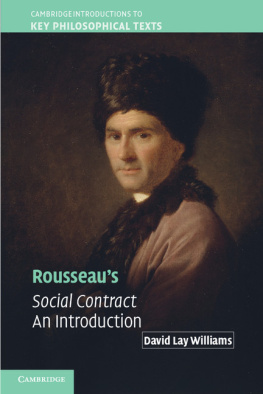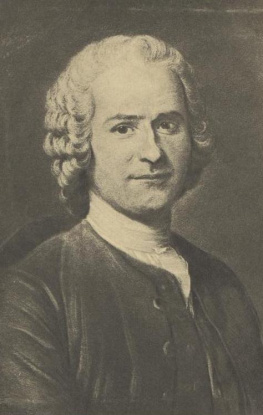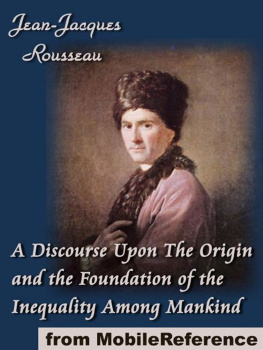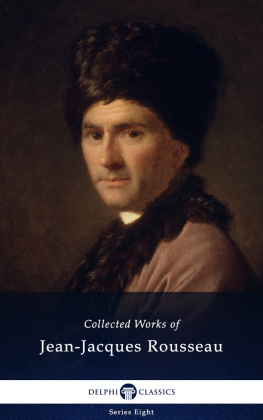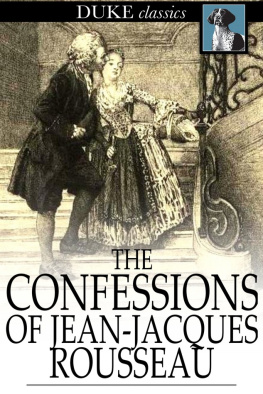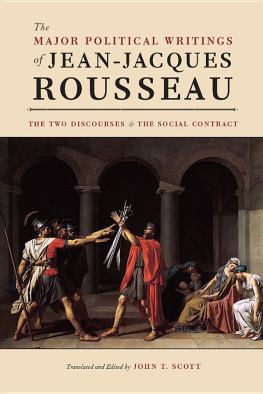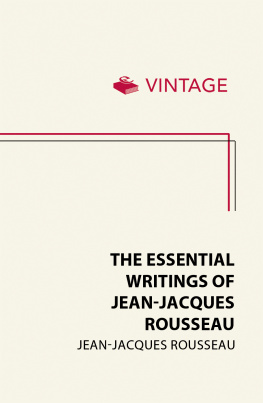Rousseau Jean-Jacques - Emile
Here you can read online Rousseau Jean-Jacques - Emile full text of the book (entire story) in english for free. Download pdf and epub, get meaning, cover and reviews about this ebook. genre: Science. Description of the work, (preface) as well as reviews are available. Best literature library LitArk.com created for fans of good reading and offers a wide selection of genres:
Romance novel
Science fiction
Adventure
Detective
Science
History
Home and family
Prose
Art
Politics
Computer
Non-fiction
Religion
Business
Children
Humor
Choose a favorite category and find really read worthwhile books. Enjoy immersion in the world of imagination, feel the emotions of the characters or learn something new for yourself, make an fascinating discovery.
- Book:Emile
- Author:
- Genre:
- Rating:5 / 5
- Favourites:Add to favourites
- Your mark:
- 100
- 1
- 2
- 3
- 4
- 5
Emile: summary, description and annotation
We offer to read an annotation, description, summary or preface (depends on what the author of the book "Emile" wrote himself). If you haven't found the necessary information about the book — write in the comments, we will try to find it.
Emile — read online for free the complete book (whole text) full work
Below is the text of the book, divided by pages. System saving the place of the last page read, allows you to conveniently read the book "Emile" online for free, without having to search again every time where you left off. Put a bookmark, and you can go to the page where you finished reading at any time.
Font size:
Interval:
Bookmark:
The Project Gutenberg EBook of Emile, by Jean-Jacques Rousseau(#14 in our series by Jean-Jacques Rousseau)
Copyright laws are changing all over the world. Be sure to check thecopyright laws for your country before downloading or redistributingthis or any other Project Gutenberg eBook.
This header should be the first thing seen when viewing this ProjectGutenberg file. Please do not remove it. Do not change or edit theheader without written permission.
Please read the "legal small print," and other information about theeBook and Project Gutenberg at the bottom of this file. Included isimportant information about your specific rights and restrictions inhow the file may be used. You can also find out about how to make adonation to Project Gutenberg, and how to get involved.
**Welcome To The World of Free Plain Vanilla Electronic Texts**
**eBooks Readable By Both Humans and By Computers, Since 1971**
*****These eBooks Were Prepared By Thousands of Volunteers!*****
Title: Emile
Author: Jean-Jacques Rousseau
Release Date: April, 2004 [EBook #5427][Yes, we are more than one year ahead of schedule][This file was first posted on July 18, 2002][Date last updated: August 22, 2005]
Edition: 10
Language: English
*** START OF THE PROJECT GUTENBERG EBOOK, EMILE ***
Steve Harris, Charles Franks and the Online Distributed Proofreading Team.
By Jean-Jacques Rousseau
Translated by Barbara Foxley
Author's Preface
This collection of scattered thoughts and observations has littleorder or continuity; it was begun to give pleasure to a good motherwho thinks for herself. My first idea was to write a tract a fewpages long, but I was carried away by my subject, and before I knewwhat I was doing my tract had become a kind of book, too large indeedfor the matter contained in it, but too small for the subject ofwhich it treats. For a long time I hesitated whether to publishit or not, and I have often felt, when at work upon it, that it isone thing to publish a few pamphlets and another to write a book.After vain attempts to improve it, I have decided that it is myduty to publish it as it stands. I consider that public attentionrequires to be directed to this subject, and even if my own ideasare mistaken, my time will not have been wasted if I stir up othersto form right ideas. A solitary who casts his writings before thepublic without any one to advertise them, without any party readyto defend them, one who does not even know what is thought and saidabout those writings, is at least free from one anxietyif he ismistaken, no one will take his errors for gospel.
I shall say very little about the value of a good education, norshall I stop to prove that the customary method of education is bad;this has been done again and again, and I do not wish to fill mybook with things which everyone knows. I will merely state that, goas far back as you will, you will find a continual outcry againstthe established method, but no attempt to suggest a better. Theliterature and science of our day tend rather to destroy than tobuild up. We find fault after the manner of a master; to suggest,we must adopt another style, a style less in accordance with thepride of the philosopher. In spite of all those books, whose onlyaim, so they say, is public utility, the most useful of all arts,the art of training men, is still neglected. Even after Locke'sbook was written the subject remained almost untouched, and I fearthat my book will leave it pretty much as it found it.
We know nothing of childhood; and with our mistaken notions thefurther we advance the further we go astray. The wisest writersdevote themselves to what a man ought to know, without asking whata child is capable of learning. They are always looking for theman in the child, without considering what he is before he becomesa man. It is to this study that I have chiefly devoted myself,so that if my method is fanciful and unsound, my observations maystill be of service. I may be greatly mistaken as to what ought tobe done, but I think I have clearly perceived the material whichis to be worked upon. Begin thus by making a more careful study ofyour scholars, for it is clear that you know nothing about them;yet if you read this book with that end in view, I think you willfind that it is not entirely useless.
With regard to what will be called the systematic portion of thebook, which is nothing more than the course of nature, it is herethat the reader will probably go wrong, and no doubt I shall beattacked on this side, and perhaps my critics may be right. Youwill tell me, "This is not so much a treatise on education as thevisions of a dreamer with regard to education." What can I do? I havenot written about other people's ideas of education, but about myown. My thoughts are not those of others; this reproach has beenbrought against me again and again. But is it within my powerto furnish myself with other eyes, or to adopt other ideas? It iswithin my power to refuse to be wedded to my own opinions and torefuse to think myself wiser than others. I cannot change my mind;I can distrust myself. This is all I can do, and this I have done.If I sometimes adopt a confident tone, it is not to impress thereader, it is to make my meaning plain to him. Why should I professto suggest as doubtful that which is not a matter of doubt tomyself? I say just what I think.
When I freely express my opinion, I have so little idea of claimingauthority that I always give my reasons, so that you may weighand judge them for yourselves; but though I would not obstinatelydefend my ideas, I think it my duty to put them forward; for theprinciples with regard to which I differ from other writers arenot matters of indifference; we must know whether they are true orfalse, for on them depends the happiness or the misery of mankind.People are always telling me to make PRACTICABLE suggestions. Youmight as well tell me to suggest what people are doing already,or at least to suggest improvements which may be incorporated withthe wrong methods at present in use. There are matters with regardto which such a suggestion is far more chimerical than my own,for in such a connection the good is corrupted and the bad is nonethe better for it. I would rather follow exactly the establishedmethod than adopt a better method by halves. There would be fewercontradictions in the man; he cannot aim at one and the same timeat two different objects. Fathers and mothers, what you desire thatyou can do. May I count on your goodwill?
There are two things to be considered with regard to any scheme.In the first place, "Is it good in itself" In the second, "Can itbe easily put into practice?"
With regard to the first of these it is enough that the schemeshould be intelligible and feasible in itself, that what is goodin it should be adapted to the nature of things, in this case, forexample, that the proposed method of education should be suitableto man and adapted to the human heart.
The second consideration depends upon certain given conditions inparticular cases; these conditions are accidental and thereforevariable; they may vary indefinitely. Thus one kind of educationwould be possible in Switzerland and not in France; another would beadapted to the middle classes but not to the nobility. The schemecan be carried out, with more or less success, according to amultitude of circumstances, and its results can only be determinedby its special application to one country or another, to this classor that. Now all these particular applications are not essentialto my subject, and they form no part of my scheme. It is enoughfor me that, wherever men are born into the world, my suggestionswith regard to them may be carried out, and when you have made themwhat I would have them be, you have done what is best for them andbest for other people. If I fail to fulfil this promise, no doubtI am to blame; but if I fulfil my promise, it is your own fault ifyou ask anything more of me, for I have promised you nothing more.
Next pageFont size:
Interval:
Bookmark:
Similar books «Emile»
Look at similar books to Emile. We have selected literature similar in name and meaning in the hope of providing readers with more options to find new, interesting, not yet read works.
Discussion, reviews of the book Emile and just readers' own opinions. Leave your comments, write what you think about the work, its meaning or the main characters. Specify what exactly you liked and what you didn't like, and why you think so.


